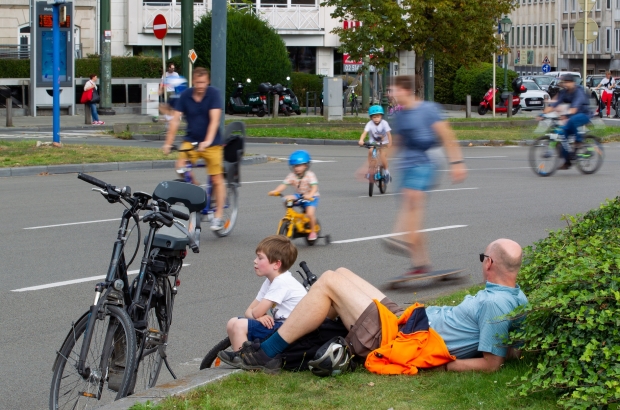- Daily & Weekly newsletters
- Buy & download The Bulletin
- Comment on our articles
Brussels mobility minister wants more Car-Free Sundays in the capital
After this weekend’s successful Car-Free Sunday, Brussels mobility minister Elke Van den Brandt (Groen) is calling for more of such days in the capital.
Car-Free Sunday was part of Mobility Week in the capital, which aims to promote alternative means of transportation that lead to lower air pollution and vehicular traffic in one of Europe’s worst-performing big cities by both metrics.
From 9.30 to 19.00 on Sunday, cars were not allowed to be driven in the Brussels region, freeing the streets for pedestrians, cyclists, roller-skaters or people on scooters.
Around 15,300 motorists were granted exceptions for being on-call medical personnel or having a disability that required them to use a car, for example.
Van den Brandt said the number of people applying for exemption certificates has been decreasing every year.
The theme for this year’s Mobility Week in Brussels was "a city for children", encouraging residents to support policies that devote more public space to children and less of it to vehicles.
“People go out, children are happy, playing and cycling in the street. This shows that we need more space,” Van den Brandt said on Sunday, when thousands of Brussels’ residents flocked to the streets to enjoy the city without fear of traffic accidents or choking car exhaust.
Discussions about increasing the frequency of Car-Free Sundays are already under way with the 19 Brussels municipalities.
“So far they are cautiously positive,” Van den Brandt said.
“We have also discussed it with the tourist and catering sector in order to reach everyone. This is a great dynamic for this city and if I have my way, these days can be repeated.”
The air in Brussels, which has a high level of vehicular traffic for a European city, is particularly bad.
In fact, Brussels is one of Europe’s most polluted capitals, with high levels of NO2 even near schools and playgrounds. NO2 is responsible for several hundred premature deaths each year.
According to the European Environment Agency, air pollution as a whole was responsible for 8,950 premature deaths in Belgium in 2018.
The year 2018 is used as a reference because it was prior to the coronavirus-related lockdowns that temporarily reduced traffic and thus air pollution.
The pollution from heavy car traffic in the city also creates a burden for keepers of historic sites such as cathedrals and churches, whose white stone turns black from soot and requires regular cleaning.
On Car-Free Sunday, significant drops in concentrations of several pollutants were recorded.
At the Arts-Loi monitoring station in an area normally with heavy traffic, NO and NO2 concentrations both dropped by 80% compared to an average Sunday. Compared to an average weekday, NO and NO2 concentrations went down by 90% and 86%, respectively.
A reduction in noise pollution was also noted. Near measuring stations located by motorways, such as on the edge of the E411 in Auderghem and near the E40 in Woluwe-Saint-Lambert, noise pressure went down by as much as 90%.
Measuring stations at Avenue Houba de Strooper in Brussels and Chaussée de Wavre in Auderghem recorded a 68% drop.

















